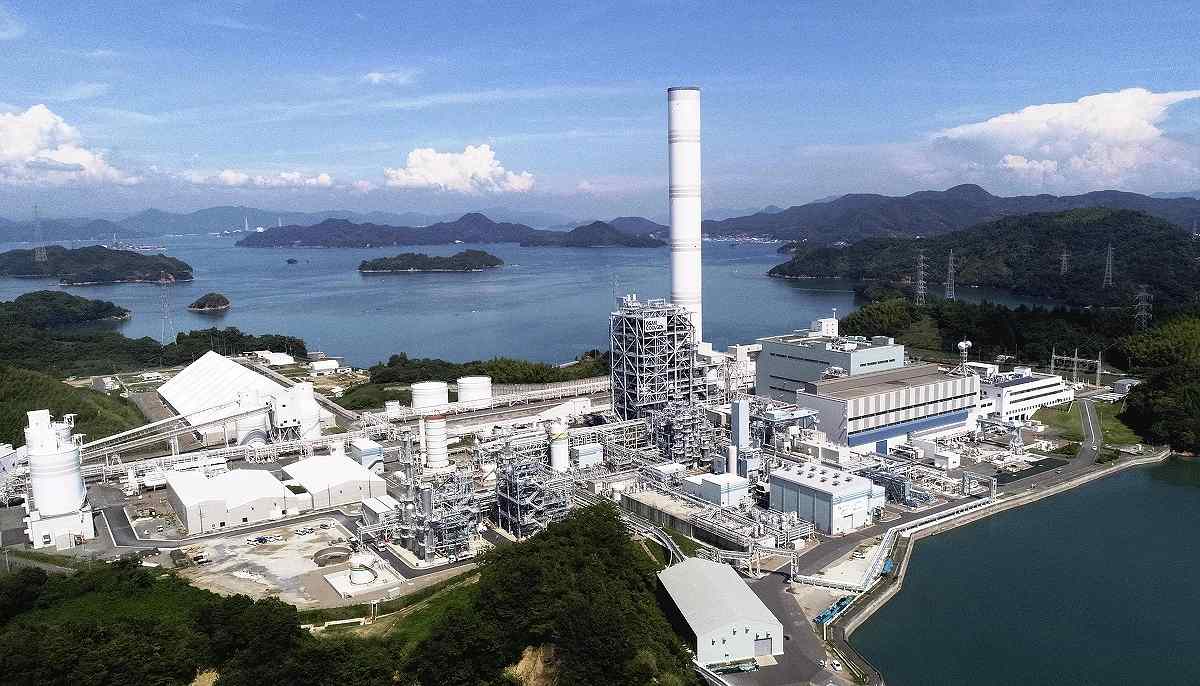
An Osaki Coolgen Corp. power plant in Hiroshima Prefecture is developing technology to collect and reuse carbon dioxide.
20:59 JST, February 10, 2021
To achieve net-zero greenhouse gas emissions by 2050, the government has begun discussions on carbon pricing, through which polluters would be charged for emitting such gases to motivate companies to reduce emissions.
Carbon pricing is one of Prime Minister Yoshihide Suga’s key policies, and he intends to make it a driving force for future economic growth. However, devising a scheme is expected to be difficult as such initiatives could depress business activity and consumer spending depending on their implementation.
The Environment Ministry held a meeting with experts to discuss carbon pricing on Feb. 1. The about 20 academics and representatives of the business community in attendance were divided over the method, with some saying that such initiatives should not be punitive and others that a carbon tax is a simple mechanism that would be expected to generate tax revenue.
Carbon pricing can be implemented in various ways, including carbon taxes and emissions trading such as credit trading, in which companies exchange credits for carbon cuts. Each method would have a different impact on companies and individuals.
A carbon tax, which is based on greenhouse gas emission amounts, and emissions trading, in which the government sets a cap on emissions and imposes a levy if it is exceeded, are systems that force companies to bear a financial burden.
If the burden is too heavy, it could lead to a stagnation of business activities and commodity price hikes.
In 2012, Japan levied a form of a carbon tax targeting fossil fuels such as crude oil and gas in proportion to the amount of CO2 emitted, but the tax rate is said to be low compared to those in other countries.
In contrast, companies would be encouraged to take voluntary action through credit trading, which allows companies to trade credits for cuts in carbon emissions by installing energy-efficient equipment, and the “non-fossil fuel energy value trading market,” in which market participants are able to trade environmental value in the form of a certificate. While such initiatives are said to promote technological innovation, some argue that they are ineffective.
A prevailing view within the Environment Ministry is that “strengthening the carbon tax is the most favored approach,” because it is easy to understand the system and is more likely to deliver results, according to a senior official, but the Economy, Trade and Industry Ministry remains cautious, as similar taxes have already been in place on gasoline and diesel in Japan.
The Environment Ministry compiled an interim report on carbon pricing in 2019, but discussions were suspended due to persistent opposition, particularly in industrial circles. Discussions have been revived since Prime Minister Suga announced late last year a target of “cutting greenhouse gas emissions to net-zero by 2050” as part of his growth strategy.
The trade ministry was also to establish a separate study panel this month to launch discussions.
Environment Minister Shinjiro Koizumi said the trade and environment ministries will be “taking different routes to the same peak,” but as the trade ministry is aiming to realize a policy that Economy, Trade and Industry Minister Hiroshi Kajiyama said would “not hinder competitiveness,” a better analogy might be that they are sleeping in the same bed but having different dreams.
There are differences in opinion even within industry circles as circumstances differ among companies, some of which possess decarbonization technology and are looking for opportunities to grow, while others face heavy burdens and opaque prospects.
Hiroaki Nakanishi, chairman of the Japan Business Federation (Keidanren) and executive chairman of Hitachi Ltd., expressed a measured approach to carbon pricing, saying, “We should not start by rejecting it.”
However, Akio Mimura, chairman of the Japan Chamber of Commerce and Industry, has expressed caution, while Nippon Steel Corp. President Eiji Hashimoto strongly opposes the idea of reinforcing the carbon tax, arguing that, “it would deprive the company of development funds, which would be counterproductive as it would hamper the objective [of promoting decarbonization].”
Initiatives to exclude companies that have fallen behind in decarbonization efforts have been accelerating worldwide. “Border adjustment measures” that would tax the products of countries and companies that are lacking in efforts are being considered in Europe and North America. As global warming is a global problem, efforts would not be effective if companies were able to shift operations to countries with lax regulations.
Akio Yamazaki, assistant professor at the National Graduate Institute for Policy Studies, said, “Carbon pricing will temporarily increase the burden on companies and consumers, but [in the long run] it will provide incentives for investment and technological innovation.”
Top Articles in Business
-

Prudential Life Insurance Plans to Fully Compensate for Damages Caused by Fraudulent Actions Without Waiting for Third-Party Committee Review
-

Narita Airport, Startup in Japan Demonstrate Machine to Compress Clothes for Tourists to Prevent People from Abandoning Suitcases
-

Japan, U.S. Name 3 Inaugural Investment Projects; Reached Agreement After Considerable Difficulty
-

JR Tokai, Shizuoka Pref. Agree on Water Resources for Maglev Train Construction
-

Toyota Motor Group Firm to Sell Clean Energy Greenhouses for Strawberries
JN ACCESS RANKING
-

Japan PM Takaichi’s Cabinet Resigns en Masse
-

Japan Institute to Use Domestic Commercial Optical Lattice Clock to Set Japan Standard Time
-

Israeli Ambassador to Japan Speaks about Japan’s Role in the Reconstruction of Gaza
-

Man Infected with Measles Reportedly Dined at Restaurant in Tokyo Station
-

Videos Plagiarized, Reposted with False Subtitles Claiming ‘Ryukyu Belongs to China’; Anti-China False Information Also Posted in Japan




















